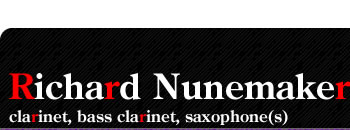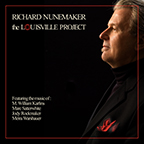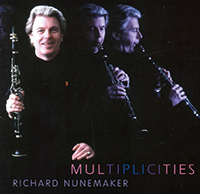Coming Events:Future events to be announced.
|
Multiplicities
Track Listing As soloist with the Houston Symphony Nunemaker has given the Houston Symphony premieres of works by Ingolf Dahl, Pierre Max Dubois, Alexander Glazunov and Heiter Villa-Lobos. He has appeared as soloist with such conductors as Lawrence Foster, Jorge Mester, Sergiu Comissiona, William Harwood, Toshiyuki Shimada, Stephen Stein, David Allen Miller, Thomas Wilkins and Mariusz Smolij. Richard Nunemaker has also recorded with the Houston Symphony Orchestra as soloist in tributes to Benny Goodman and Artie Shaw with Newton Wayland, conducting. He has also appeared in live Houston Symphony Orchestra television broadcasts as soloist with Newton Wayland, Sergiu Comissiona and David Allen Miller, conductors. In addition to being a member of the Houston Symphony Orchestra, Richard Nunemaker is also a past president and served as Executive Director of the Houston Composers Alliance (HCA). HCA presents and commissions new works for several annual concerts in the Houston area of music by living American/Houston composers. Richard Nunemaker is a founding member of Airmail Special, a quartet of Houston Symphony musicians who performs original material for student and family concerts in the Houston area. During its 12 year existence, Airmail Special has presented approximately 250 live performances in the Greater Houston area schools. Following the 1993 release of the CD, Golden Petals (MMC 2005), he toured Austria (as soloist) with bassist Peter Herbert and the Camerata Bregenz. And in 1994 he was featured in the New and Improvised Music Concert with composer William Thomas McKinley at Carnegie Hall. Richard is a graduate from the State University of New York at Fredonia with a Bachelor of Science degree in Music Education (1964) and was awarded a Performer’s Certificate in Clarinet. Nunemaker also graduated from the University of Louisville (1966) with a Master of Music degree in clarinet. In 2002 Richard Nunemaker was honored as an outstanding alumnus from the University of Louisville and presented with the permanent title of Alumni Fellow. Richard Nunemaker has commissioned over 25 composers for more than 50 original works or arrangements. The Clarinet by Theodore Jahn Multiplicities. Richard Nunemaker, clarinet; with assisting artists Sylvie Beaudette and Scott Holshouser, pianists; Jay Harper, Kemoki Bunting, Brian Fruechtenicht, Scott Cummings, percussionists, David Colson, conductor; the T’ang Quartet (Yu-Ying Ng and Chek Ang, violins; Lionel Tan, viola; and Leslie Tan, cello). Jody Rockmaker Multiplicities (1995); David Colson: Dragon Music (1997); John Anthony Lennon: Spiderdance (1995); Richard Lavenda: Quintet for Clarinet and Strings (1997). RED MARK RECORDS CD 9213. Total time 58:37. (Available from Red Mark Records, 2832 Spring Grove Ave., Cincinnati, OH 45225 (http://www.liben.com) The title Multiplicities sums up in one work (word?) the great variety of contemporary clarinet techniques and sounds to be heard on this CD. The soloist, Richard Nunemaker commissioned the four featured pieces from members of the Houston Composers Alliance (Music by Living American/Houston Composers), of which Nunemaker is past president. The contemporary music styles represented are somewhat conservative and very accessible, even on first hearing. These engaging pieces are extremely well written for the clarinet and seem tailor-made for Nunemaker who is noted for his extraordinary skills in both classical and jazz music on clarinet, bass clarinet and saxophone. Each composition features the performer in a different instrumental setting. The title piece, Multiplicities by Jody Rockmaker, is unaccompanied. Dragon Music by David Colson employs percussion ensemble for accompaniment. In Spiderdance by John Anthony Lennon, Nunemaker performs as part of a clarinet and piano duo, and the clarinet forms an equal partnership with string quartet in Quintet for Clarinet and String Quartet by Richard Lavenda. Rockmaker’s Multiplicities is a tour de force of multiphonics writing for clarinet. The first note is a grating multiphonic with downward and upward pitch slides, followed by delicately produced two-note multiphonics and finally a chord progression consisting of a series of multiphonics. The multiphonics are interspersed with so-called normal sounds such as glissandi and soft, fast finger passages of 32nd notes. The logical presentation of this varied material gives the piece a definite sense of form. The great variety in timbre and motivic gestures makes Multiplicities the showpiece of the album and displays Nunemaker’s ability to move from technique to technique with amazing flexibility. Colson wrote Dragon Music for clarinet and a full battery of percussion including piano, which often provides an ostinato above which the other instruments add color and their own percussive energies. The clarinet, which is, of course, the main attraction, is employed in many ways like a percussion instrument. Rapid trills, fast rhythmic figures and extreme flourishes suggest an oriental dragon procession complete with fire-crackers. The clarinet also portrays the dragon in a more subdued and almost languid mood, employing sustained, jazz-oriented figures which give Nunemaker ample opportunity to showcase a quasi-improvisational style; minimal percussion effects provide atmosphere and a sense of rhythmic pacing. The well-crafted and exciting Dragon Music is a substantial addition to the clarinet/percussion repertoire. Lennon’s Spiderdance is the most delightfully descriptive piece on the CD and will surely become a recital standout. As a duo for clarinet and piano, it depends heavily on the piano to describe the movements of a spider, with the clarinet providing commentary as a kind of witness to the spider’s movements. The outstanding pianist, Scott Holshouser, gives a vivid impression of a spider marching up and down the keyboard. Lavenda’s Clarinet Quintet, commissioned to fill half an evening’s program, is a large, difficult-sounding work in three movements. The first movement, “Blaze,” is an exciting display of technical fireworks performed with precision by Nunemaker and Rice University’s excellent T’ang String Quartet. The slow-moving “Serenade” contains rich string and clarinet sonorities evoking a little of the atmosphere of the second movement of the Brahms Quintet; in fact, at one point there is a startling melodic quote by the clarinet from that movement. The last movement, “Dynamo,” is a showpiece containing many jazz elements and rhythms which are tossed back and forth between clarinet and strings. This piece integrates the use of clarinet and string quartet very well, with the clarinet being a part of the ensemble and not always the leading voice. All of the performers on this album are first-rate. Nunemaker is particularly stellar. He displays effortless control of the many 20th-century techniques required by these compositions while still maintaining beauty of tone and natural ease of expression. I recommend this recording very highly, not only as a fine performance but also as a presentation of four excellent pieces of contemporary clarinet music, which deserve to be heard and performed often. Sorting Them OutThe ClarinetThe New Music Connoisseur Barry L. Cohen RICHARD NUNEMAKER 'Golden Petals', Music of Stravinsky, Misurell-Mitchell, English, McKinley, Shaw, MMC 2005 ‘MULTIPLICITIES’, Music of Rockmaker, Colson, Lennon and Lavenda …"Brilliant, technically amazing, and fearless as well. Richard Nunemaker is a member of the Houston Symphony, a top-rated solo performer on clarinet, bass clarinet, and sax, and a musician with lots of premieres and commissions to his credit. Like many a single-reedist, he explores the jazz lit unashamedly and is willing to share that fondness with his CD audience. The album ‘Golden Petals’ offers five compositions so different from each other in style and substance the wonder is their juxtaposition makes any sense at all. And, although, we’ll accept only one of the selections as bona fide serious new music, the whole album is refreshing just for that alone…. The title piece (date 1985) is another one of McKinley’s no-holds barred essays in tension and release, a 22-minute work for bass clarinet, saxophone and percussion that some will find absorbing, others painful— that's McKinley. On another level, his status as the brains behind MMC Records once again assures his being the star of the show, at least the compositional one. …The arrangement of the Shaw (Clarinet Concerto) by Newton Wayland, on the other hand, lets the sunlight of strings into the big band mix and gives the work some added class. Though we should really save the sax for a more appropriate survey, we’ll mention that the text for Alone Together is by William Bolitho Ryall, a South African. It’s an homage to the instrument that sounds sincere if a bit corny, helped a lot by the smooth and polished narration of Dr. Chris Steele. Also noteworthy, besides Nunemaker’s precise, yet always energetic playing (often when time seems to be standing still), is the nimble work (jazz and arco) of jazz bassist Peter Herbert, especially in the McKinley, and the all-around fine effort of the Pierrot Plus Ensemble, associated with Rice University. If ‘Golden Petals’ shows off Nunemaker’s versatility, his ‘Multiplicities’ album focuses on his impressive virtuosity. The disc also seems more serious in intent, all of the compositions, for good or bad, emerging from abstract ideas with, perhaps, one exception-John Anthony Lennon’s Spiderdance of 1995, a 5 1/2-minute piece for clarinet and piano (Scott Holshouser). Mr. Lennon offers no comments on the composition other than this wry verse. the spider laughs Thus what we get is a happy, but quirky, jerky little dance in a mostly septimal (or triple-square, triple-square, etc.) meter. We find the title selection, by Jody Rockmaker, hard to grasp in two or three hearings. It begins with spaced, clearly audible morsels for the soloist — swells, brief motives using techniques like flutter-tonguing, multiphonics, etc.—that are later expanded into longer riff-like cadenzas. But much of it contains plumbings in the lower register that are not fathomable to these faltering ears and are heard as virtual rests. We’re all for experimentation, but before making that compositional plunge composers ought to ask themselves more often “why?” David Colson’s Dragon Music is a multi-stylistic sextet for clarinet, piano (Sylvie Beaudette) and four percussionists (Jay Harper, Kemoki Bunting, Brian Fruechtenicht and Scott Cummings). There are several exciting passages for all six forces that come out of jazz, Latin music and rock, but they last only briefly so that the clarinetist can shine in a variety of moods. The work ends on a strangely quiescent note. Mr. Colson leads the forces. Most ambitious is Richard Lavenda’s 33-minute Quintet for Clarinet and String Quartet (1997). With so many chamber forms now long fossilized, it is a wonder this combination, going back to Mozart, has endured over the centuries. Don’t expect Mr. Lavenda’s opus to sound like Mozart; the underlying spirit, however, is there — the sense of apartness and togetherness, the exploring of timbral possibility, the moodiness within the more or less disciplined structure. Typically, it is in three movements with the middle "Serenade" a bit freer than the outer two (marked "Blaze and "Dynamo”), but also excursive of the push and pull character of this combo, Mr. Nunemaker is beautifully supported by the T’ang Quartet. Overall rating:…Mr. Nunemaker’s credentials are firm and his musicianship quite alive and often daring… |
Links of Interest |
||
|
© 2006 - 2026
|
||||


